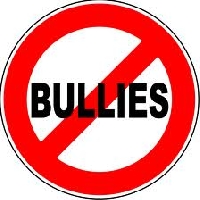
Why do children bully is a serious question for parents and educators
Bullying has existed since the beginning of time. Ask your parents or grandparents if they were ever bullied and the answer is probably yes. More than one parent has trekked to school because their child is under siege by a bully. Bullying is mean, dangerous and has an awful impact on the child that is the target.
Kids bully for various reasons, none of which make this behavior acceptable. Children who are more apt to bully than others may be from homes where there is lack of supervision, love or warmth from their parents or whose parents are extremely permissive and don?t establish parameters that the child must stay within, behaviorally and otherwise.
Bullying is sometimes the behavior of a child who is the victim of older brothers, or who is subjected to severe physical discipline by his parents. It could be that the child?s parents are bullies and he is emulating their behavior.
If a child hangs out with friends who are bullies he may assume this persona. If these friends happen to be pro-violence this can influence another child?s behavior. Kids that have low social status sometimes use bullying to direct unwanted attention away from themselves and towards other, which they believe improves their social standing among those who have higher status.
Kids like to feel that they belong but getting into the perceived ?in crowd? via bullying is not the way to achieve this. Some children are inherently aggressive and become bullies to maintain their social power and safeguard their social standing.
Some teenage girls can, unfortunately, be very cruel. They seem to derive a sense of excitement from bullying and it gets them attention, although it?s certainly not always positive attention. Other girls become their friends and subordinates perhaps because they?re afraid not to. There is the old adage: Keep your friends close and your enemies even closer.
Kids see too much bullying behavior on TV, courtesy of video games, movies and online and this influences them and makes them think this is cool behavior. It is not.
Schools where bullying is not addressed and punishment put in place for this type of behavior are beehives for this type of activity.
There is something about the crowd mentality, which can affect adults as well as children, where bad behavior is supported by the group and even encouraged. This can promote bullying.
Bullying appears to have become more prevalent or perhaps the country is simply hearing more about it. Every day there is news about cyber bullying, via Facebook or cell phones and texting and it has resulted in some horrible outcomes, such as suicide. This is tragic and irrevocable and something that parents and schools need to address most aggressively and adamantly.
If you notice that your child is frequently losing items and property (e.g. his cell phone) or these items are damaged this can be a sign that he is the victim of bullying. If he spends a lot of time with kids that are younger than he is rather than with those that are his age they may mean that he is having a problem with his peers.
A child that is bullied may complain of stomach- and headaches, sleeps too much or not enough, is a loner and tends to arrive at school just as the tardy bell rings because he wants to avoid interaction with other students.
If you suspect that your own child is a bully, which is a hard pill to swallow, some of the symptoms that he may display include lack of compassion, an impulsive personality, failure to conform to rules, above average self esteem and an attitude towards pro-violence.
~
There is a term for those children who are popular and liked, even by teachers, but they tend to fight, argue, exhibit aggressive behavior and get in trouble. These children are called ?hidden bullies.?
Keep the lines of communication open with your child if you suspect that he is being bullied ask him. If you suspect that he is engaging in bullying, have a very serious decision about the ramifications of such behavior.
